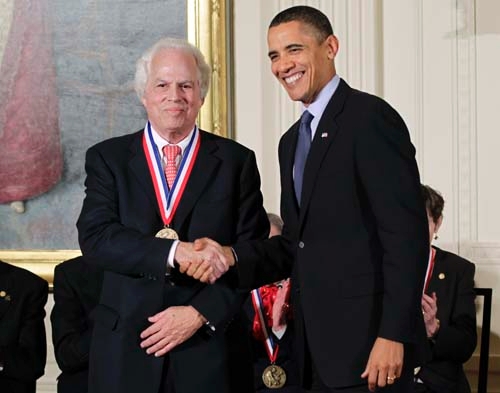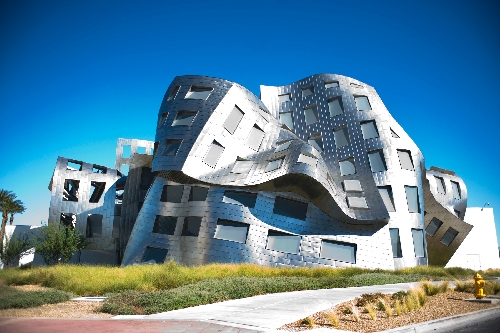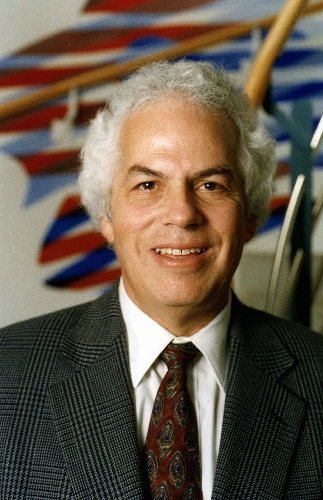Nobel winner joins Lou Ruvo Center




Nobel Prize laureate Dr. Stanley Prusiner, who discovered a revolutionary new class of proteins that cause devastating brain diseases in both animals and humans, has become chairman of the scientific advisory board of the Cleveland Clinic Lou Ruvo Center for Brain Health.
Though the official announcement of Prusiner’s new affiliation with the medical center near downtown Las Vegas will not be made until its Feb. 18 fundraising gala, Larry Ruvo — founder of the center that was named in honor of his late father — confirmed Friday that Prusiner accepted the position that will help guide the work of the Cleveland Clinic Alzheimer’s researchers in Las Vegas, Ohio and Florida.
Ruvo, a philanthropist whose passion for finding a cure for Alzheimer’s disease has been recognized by top health officials around the world, said he is confident that the association of the 69-year-old Prusiner with the Ruvo Center will bring more top researchers and physicians to Nevada.
Top physicians, he said, want to go where groundbreaking work is being done on brain diseases, including Alzheimer’s, the horrific disease that kills brain cells, a modern-day plague now affecting more than 8 million Americans.
Dr. Jeffrey Cummings, director of the Ruvo Center, said Friday that the most human trials involving drugs directed at stopping or preventing Alzheimer’s are being done through the Cleveland Clinic’s Ruvo Center for Brain Health.
“We’re in charge of trials not only in Las Vegas but at two centers in Cleveland and one in Florida,” Cummings said.
In the citation announcing Prusiner’s
$1 million 1997 Nobel award in physiology or medicine, Sweden’s Karolinska Institute said: “Stanley Prusiner’s discovery provides important insights that may furnish the basis to understand the biological mechanisms underlying … demential-related diseases, for example Alzheimer’s disease, and establishes a foundation for drug development and new types of medical treatment strategies.”
In an email sent Friday, Prusiner, currently the director of the Institute for Neurodegenerative Diseases at the University of California, San Francisco, wrote that he accepted the request of Ruvo to serve as chairman of the scientific advisory committee so he could work with Ruvo and with Cummings and his wife, Kate Zhong, both of whom are internationally recognized Alzheimer’s researchers.
“Together,” he said, “we will do our utmost to address the challenges of brain health and discover drugs that stop Alzheimer’s disease.
Prusiner will continue his research in San Francisco.
Because he will be attending a conference in England, Prusiner will not be at the Feb. 18 gala, but Cummings said he expects that Prusiner “will be here through a video presentation.”
The proteins first discovered by Prusiner have been linked to the deadly epidemic of mad cow disease and to certain types of human dementia, including the rare Creutzfeldt-Jakob disease and Alzheimer’s.
“Some of the proteins in Alzheimer’s are just like the proteins of mad cow’s disease,” Cummings said. ” We are looking forward to one day taking what Dr. Prusiner learns in the lab into clinical trials.”
It was in the 1970s that Prusiner’s groundbreaking research began.
He discovered the cause of the sudden and mysterious form of brain disease called Creutzfeldt-Jakob disease. He found that harmful proteins, which he named “prions,” were forcing the normal proteins around them to misfold, forcing a chain reaction that within months ravaged the brain.
Though once hotly debated in the medical world, prions are now a fact of medicine.
Prusiner’s work on prions helped scientists understand mad cow disease, which is also known as bovine spongiform encephalopathy.
It’s called mad cow disease because an infection affects a cow’s nervous system, causing it to act strangely and lose control of its ability to do normal things, such as walk.
When it’s discovered among animals –as it was in Great Britain in recent years — people are understandably fearful. It can be transmitted to people if they eat meat that came from a cow that has the infection, placing an individual at a much higher risk for getting the human form of the disease, Creutzfeldt-Jakob.
Prusiner argues, and Cummings concurs, that prion disorders — all dementing diseases involve the twisting and spreading of harmful proteins — are better understood than most brain diseases, which may pave the way for better treatments for diseases such as Alzheimer’s and Parkinson’s.
“I think our work with Dr. Prusiner is going to be very beneficial to the people of the world,” Cummings said.
Contact reporter Paul Harasim at pharasim@reviewjournal.com or 702-387-2908.












